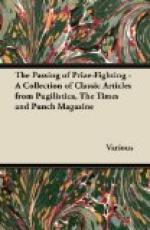Well, I reviewed Mr. Blank’s book, Rotundity. As I expected, the first draft had to be re-headed “A Corner of Old London,” and used elsewhere; Mr. Blank didn’t get into it at all. I kept promising myself a sentence: “Take Rotundity, for instance, the new novel by William Blank, which, etc.,” but before I was ready for it the article was finished. In my second draft, realizing the dangers of delay, I began at once, “This remarkable novel,” and continued so for a couple of sentences. But on reading it through afterwards I saw at once that the first two sentences were out of place in an article that obviously ought to be called “The Last Swallow;” so I cut them out, sent “The Last Swallow: A Reverie” to another Editor, and began again. The third time I was successful.
Of course in my review I said all the usual things. I said that Mr. Blank’s attitude to life was “subjective rather than objective” ... and a little lower down that it was “objective rather than subjective.” I pointed out that in his treatment of the major theme he was a neo-romanticist, but I suggested that, on the other hand, he had nothing to learn from the Russians—or the Russians had nothing to learn from him; I forget which. And finally I said (and this is the cause of the whole trouble) that ANTOINE VAURELLE’S world-famous classic—and I looked it up in the Encyclopaedia—world-renowned classic, Je Comprends Tout, had been not without its influence on Mr. Blank. It was a good review, and the editor was pleased about it.
A few days later Mr. Blank wrote to say that, curiously enough, he had never read Je Comprends Tout. It didn’t seem to me very curious, because I had never read it either, but I thought it rather odd of him to confess as much to a stranger. The only book of VAURELLE’S which I had read was Consolatrice, in an English translation. However, one doesn’t say these things in a review.
Now I have a French friend, Henri, one of those annoying Frenchmen who talks English much better than I do, and Henri, for some extraordinary reason, had seen my review. He has to live in London now, but his heart is in Paris; and I imagine that every word of his beloved language which appears, however casually, in an English paper mysteriously catches his eye and brings the scent and sounds of the boulevards to him across the coffee-cups. So the next time I met him he shook me warmly by the hand, and told me how glad he was that I was an admirer of ANTOINE VAURELLE’S novels.
“Who isn’t?” I said with a shrug, and, to get the conversation on to safer ground, I added hastily that in some ways I almost liked Consolatrice best.
He shook my hand again. So did he. A great book.
“But of course,” he said, “one must read it in the original French. It is the book of all others which loses by translation.”
“Of course,” I agreed. Really, I don’t see what else I could have done.




